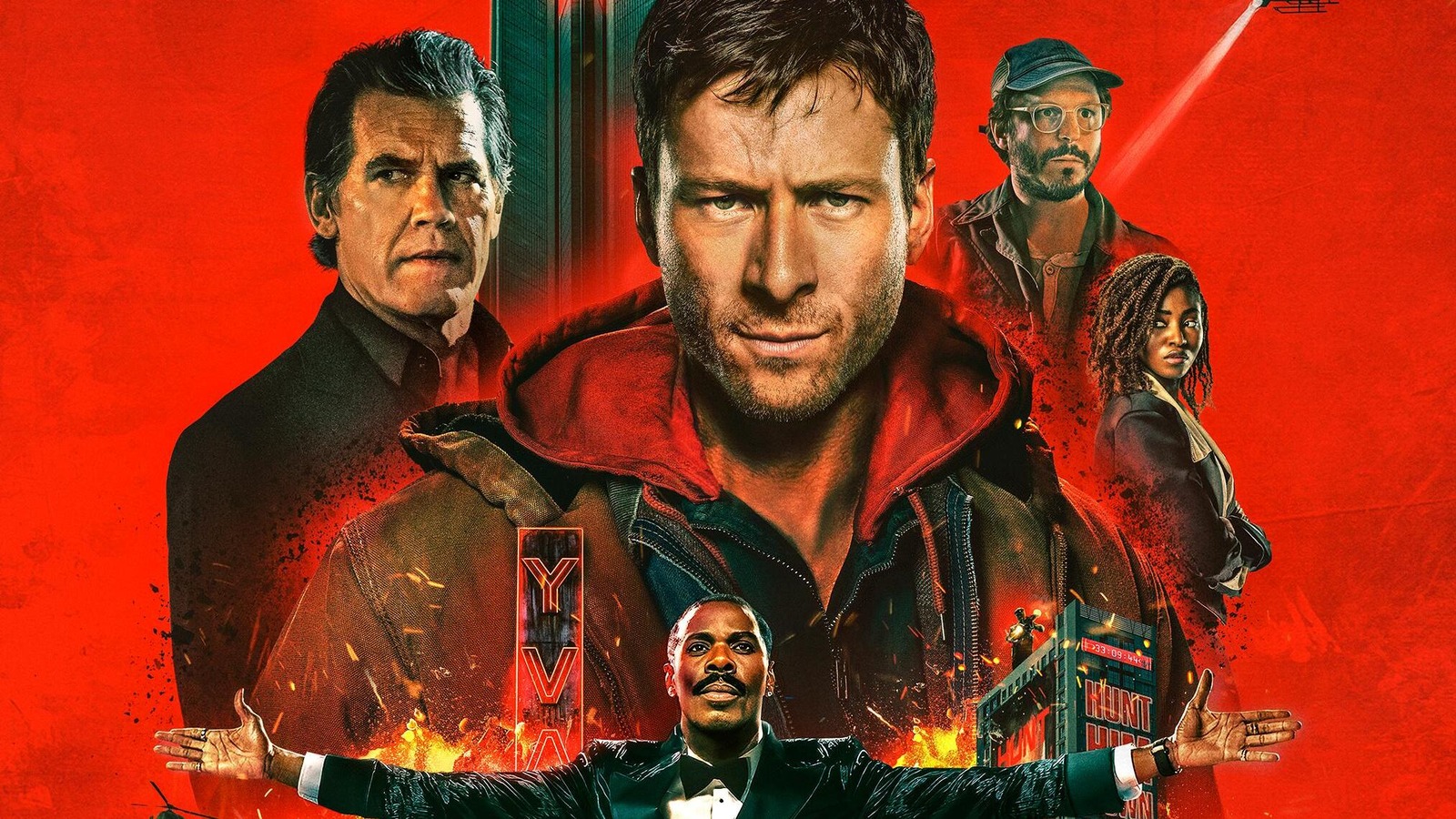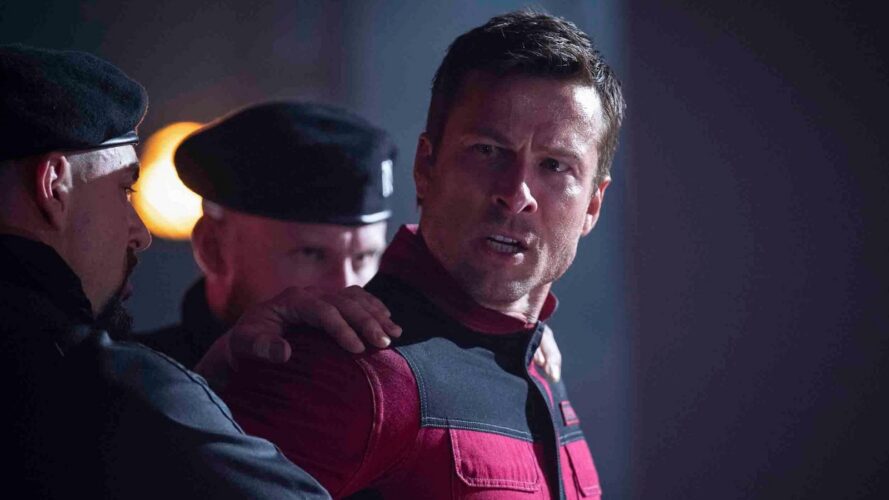

Featured Review
The Running Man ★★★
Release: 12th November 2025
Director: Edgar Wright
Starring: Glen Powell, Emilia Jones, Josh Brolin, Katy O’Brian, Lee Pace, Colman Domingo, William H. Macy, Michael Cera, Jayme Lawson & Daniel Ezra
“Don’t worry. Daddy is not that crazy!” says Ben Richards (Glen Powell) as he cradles his sick two-year-old daughter whilst observing an ad for The Running Man on television. His child is in desperate need of medical attention. His partner Sheila (Sinners star Jayme Lawson) works at a bar to cover costs while Richards struggles to find work after being blacklisted. Richards is an angry man, and however off-brand the comment is, it is the first instance of his willingness to do whatever it takes to make sure his family is better off.
Right from the get-go, difference was going to be the operative word here in Edgar Wright’s 2025 interpretation of the Stephen King novel (under the then pseudonym of Richard Bachman when he first wrote it in 1982). It closely aligns with King’s original premise: living in a totalitarian society where network TV and propaganda are king, Richards enlists to take part in a deadly TV show that will ultimately change his life. Wright’s film is a departure from Paul Michael Glaser’s 1987 attempt. Glaser’s vision was befitting of the decade, an over-the-top layer of camp indulgence with its WWE-level of caricature characters and one-liner brilliance of Arnold Schwarzenegger. Naturally, Wright cannot follow in those footsteps. His version is a culture shock iteration, toning down these elements to produce something grounded and low-key for a dystopian future. Admittedly, that takes some time to familiarise with, and in that shift of acceptance, the new interpretation doesn’t always stick its landing.
The Running Man comes in a year where Stephen King adaptations have ruled the big screen (The Long Walk, The Life of Chuck and The Monkey) and TV (IT: Welcome to Derry and The Institute), reiterating not only the cultural relevance of King’s work of the ordinary meeting the extraordinary, but how closely society has mirrored those dark elements that King nightmarishly envisioned. The Running Man is no different with its thematic conversations on the formatted nature of TV and corporate America, running and dictating all cultural facets, where it happily deepfakes, pacifies and spreads disinformation whilst setting the helpless as the dregs of society who deserve everything coming to them. Audiences are encouraged to participate for their own chance to be a hero, under the snitching guise of “record, report and reward”. All cleverly designed to pit people against each other to see the poor as the enemy. A separated individualistic mindset of divide and conquer prizes rather than allowing the building of communities and infrastructures where everyone wins.

It’s this culture war divide from King’s novel that Wright’s film faithfully adapts. Alongside his co-writer Michael Bacall, their screenplay decorates those facts as a reconciliation of its violent past: America has lost itself to a bloodthirsty appetite for carnage, it’s its “birthright” as suggested by Colman Domingo’s Bobby Thompson’s enthusiastic showmanship. In the case of the rigged ethos of The Running Man, normalising for entertainment and ratings.
Judging the film on its own merit, The Running Man’s concept, where it sheds its gladiatorial arena of Glazer’s film for Wright’s open-world killing fields, should have been ripe for deeper exploration and tailor-made for the director. The prime essence is there, constantly heightening Richards’s desperation for the financial reward whilst putting him through his paces that would make great TV, thanks to sleazy producer Dan Killian (Josh Brolin). Unfortunately, Wright’s film can’t escape its lightweight execution, a notable clash of styles between the subject matter and his own directorial vision.
Granted, Wright’s film is more of a slow burner than the music video-esque, needle drop punches of energy we’re famously familiar with, but for a director who mastered a kinetic dynamism of his storytelling in The Cornetto Trilogy and Scott Pilgrim vs. the World, Wright’s latest effort is strangely lacking. It’s a subdued affair, often wrestling with Richards’ state of mind, The Hunters (led by Lee Pace’s Evan McCone), its politics (and its subsequent rallying behind Richards) and the absurdity of the rigged game. Camera shots lack zip and energy alongside a flat visual humour that doesn’t do enough to take advantage of Powell’s notable on-camera charisma and penchant for comedy. Even when The Running Man introduces its rebellious characters, such as Michael Cera’s Elton, designed to be the quirky comic relief to protect Richards with his Home Alone antics, the insanity lacks impact.
The light touches and pacing doesn’t help, but the bigger the topic of the discussion Wright presents, the more he can’t quite reign that in to feel satisfactory, and certainly where audiences feel the gravity and weight of those consequences. They’re surface-level at best, and while comparisons are unfair, Francis Lawrence’s The Long Walk, for instance, is far more effective – and that’s done with far fewer ‘bells and whistles’ set up and smaller worldbuilding.
When it remembers to have fun, then Powell is in fine form to deliver. He’s no Schwarzenegger, but he’s not supposed to be. He plays Richards as an everyday working-class man (think John McClane in Die Hard), the kind of performance where you root for the underdog. He provides enough presence to pull off some of the film’s emotional swings and payoff moments, such as the zero-gravity plane sequence or surviving The Hunters amid a hotel explosion and delights where it matters. While characters such as Katy O’Brian’s Laughlin and Pace are severely underused, the scene-stealer belongs to Domingo, who understood the assignment as The Running Man‘s host, with his one-liners delivered with plenty of sass and energy that easily remind audiences of the film’s potential.
And potential is what could have been. Whilst a faithful adaptation nevertheless, Edgar Wright’s reimagining is solid enough as an entertaining spectacle, but not memorable enough to live long after the credits roll.
-

 Featured Review4 weeks ago
Featured Review4 weeks agoAvatar: Fire And Ash ★★★★
-

 Features3 weeks ago
Features3 weeks agoWhy are Casino Games a Popular Theme in Movies?
-

 Featured Review5 days ago
Featured Review5 days agoHamnet ★★
-

 Featured Review2 weeks ago
Featured Review2 weeks agoTeam MM’s Favourite Films Of 2025
-

 News1 week ago
News1 week agoFull UK Line-Up Announced For 2026 Japan Foundation Touring Film Programme
-

 Movie Reviews20 hours ago
Movie Reviews20 hours agoPeople We Meet On Vacation ★★★
-

 Movie Reviews1 week ago
Movie Reviews1 week agoThe Spongebob Movie: Search For Squarepants ★★
-

 Movie Reviews5 days ago
Movie Reviews5 days agoThe Housemaid ★★★





